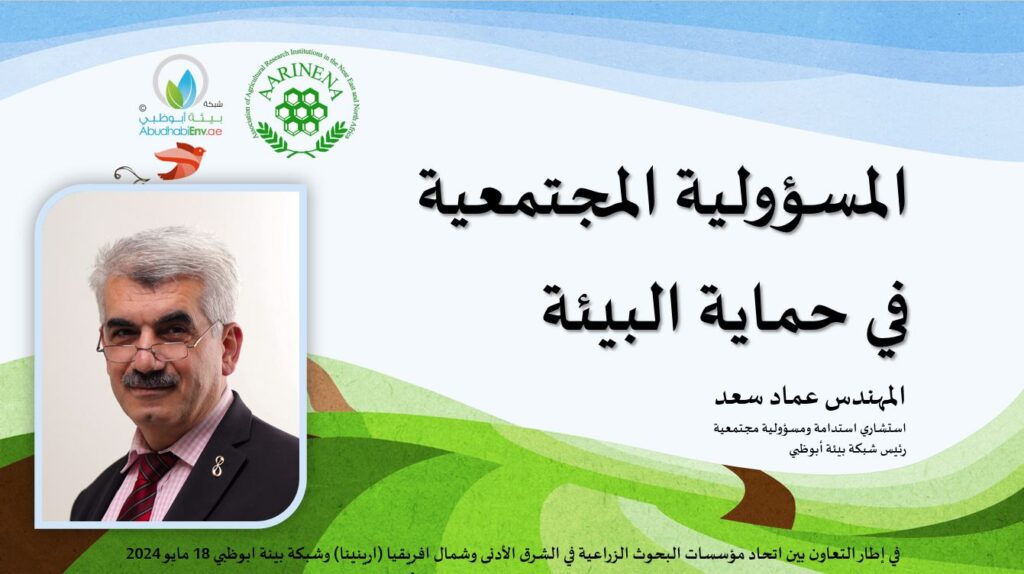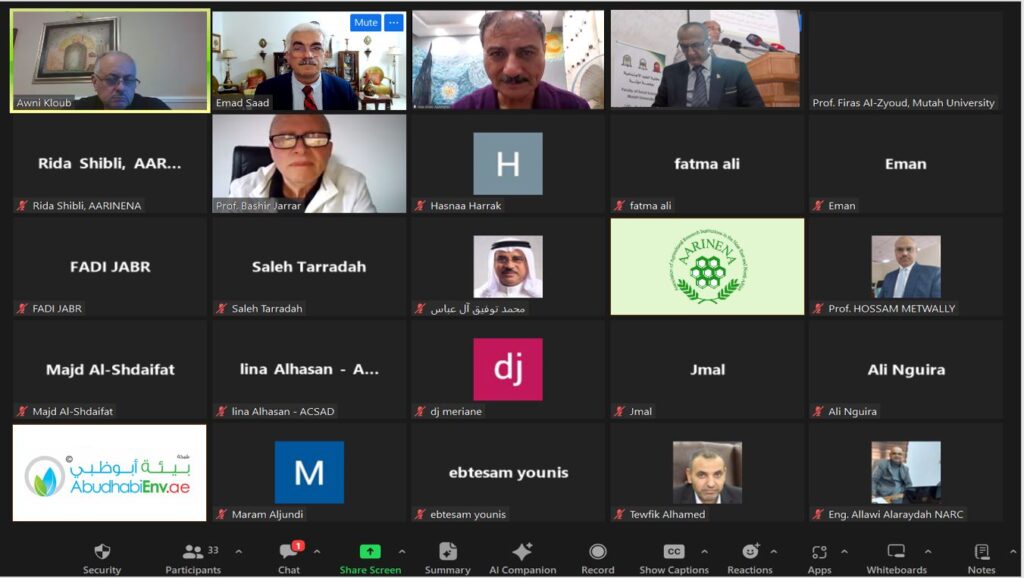
May 18, 204
Emad Saad:
- To live in environmental peace, the concentration of CO2 in the atmosphere should not exceed 350 ppm (parts per million), while the current level has surpassed 426 ppm, and the future looks more dangerous.
- Whether we like it or not, we must reduce greenhouse gas emissions and adapt to climate changes.
- We must promote the concept of shared responsibility among all segments of society to protect the environment because, simply put, we are all partners in this responsibility.

As part of the cultural activities of the Plant Protection Network within the Association of Agricultural Research Institutions in the Near East and North Africa (AARINENA), and in collaboration with the Abu Dhabi Environment Network, the association hosted Eng. Imad Saad, a sustainability and social responsibility expert and the head of the Abu Dhabi Environment Network, to deliver a scientific webinar titled “Social Responsibility in Environmental Protection.” The webinar took place on Saturday, May 18, 2024. The event was attended by His Excellency Dr. Rida Shibli, the Executive Secretary of AARINENA, and Prof. Firas Al-Zyoud, the Coordinator of the Plant Protection Network/AARINENA from Mutah University in Jordan, along with a distinguished group of association members and interested individuals from across the NENA region.
Dr. Rida Shibli, the Executive Secretary of the Association of Agricultural Research Institutions in the Near East and North Africa (AARINENA), expressed his deep appreciation for the outstanding scientific webinar presented by Eng. Imad Saad, the head of the Abu Dhabi Environment Network. The webinar highlighted the importance of adopting responsible and sustainable practices towards the environment by both institutions and individuals. He emphasized that environmental protection is not just a governmental responsibility but a societal duty that includes everyone: “Through cooperation and coordination among various sectors, we can make significant progress towards a more sustainable future.”
The Executive Secretary added, “At AARINENA, we are committed to supporting initiatives that enhance environmental awareness and encourage the adoption of sustainable agricultural practices. We will work diligently to follow up on the recommendations from this webinar to reinforce the role of social responsibility in protecting our environment. We also thank Eng. Imad Saad for his valuable contribution and look forward to further collaboration with the Abu Dhabi Environment Network and all concerned entities to achieve our common goals in the field of environmental sustainability.”
Prof. Firas Al-Zyoud, the Coordinator of the Plant Protection Network/AARINENA, praised the valuable information and important topics addressed by Eng. Imad Saad. These included the United Arab Emirates’ efforts in water recycling, greywater, and wastewater management, as well as the transition to digital governance, which reduces paper usage and helps preserve green spaces, thereby protecting the atmosphere from greenhouse gas emissions. He also emphasized the importance of involving individuals, especially in our Arab countries, in this responsibility, rather than leaving it solely to governments.
Dr. Al-Zyoud highlighted the importance of addressing the impact of climate change on urban infrastructure, noting that, according to Eng. Imad Saad, the UAE recently experienced 250 mm of rainfall in four hours during the latest storm, compared to the usual annual average of 100 mm. This alarming statistic indicates that globally, we are heading down an irreversible path unless we immediately start taking all necessary measures to adapt to or mitigate the effects of climate change.
Dr. Al-Zyoud stressed the importance of organizing more similar webinars due to their significance. He thanked AARINENA, represented by its Executive Secretary Dr. Rida Shibli, for consistently promoting such webinars and opening discussions for attendees, including interested parties and specialists from all over the Near East and North Africa.
From his side, Eng. Imad Saad, Consultant in Environmental Protection Applications, Climate Change, Social Responsibility, and Sustainable Development, and General Manager of Naya Group for Excellence, as well as the Head of the Abu Dhabi Environment Network, highlighted during the webinar the complementary relationship between social responsibility and sustainable development. He explained that both work towards building a balanced relationship between the environment, the economy, and society. In other words, social responsibility serves as the executive arm for achieving sustainable development.
He highlighted the major environmental challenges facing all countries around the world, especially climate changes, noting that no country is immune to the negative impacts of climate change. According to the international action plan for sustainable development, which was established at the Earth Summit in Rio de Janeiro in 1992, the Johannesburg Summit in 2002, and Rio+20 in 2012, the primary cause of the continuous environmental degradation worldwide is the unsustainable patterns of production and consumption.
To live in environmental peace, the concentration of carbon dioxide should not exceed 350 parts per million (ppm). However, it has surpassed 426 ppm in the atmosphere, as confirmed by the Intergovernmental Panel on Climate Change (IPCC). This situation necessitates recognizing the danger posed by this increase and considering the reduction of greenhouse gas emissions regardless of each country’s share and the pollution it causes globally. In addition, it is crucial to adapt to climate changes whether we like it or not because we are in the eye of the storm and cannot go back; the future is more dangerous and severe.
This was emphasized by the Paris Agreement on climate change, reached during the Climate Summit in Paris in 2015. The summit underlined four key points: the necessity to reduce greenhouse gas emissions, adapt to the forthcoming changes in global climate, transfer technology to developing countries, and build capacities.
For those who missed the lecture, you can watch and download a copy through the following link:
https://youtu.be/gbiPu5SYKKs?feature=shared